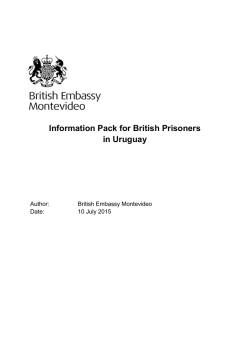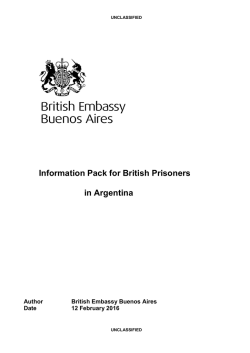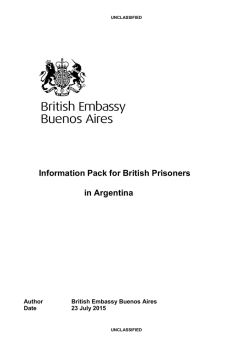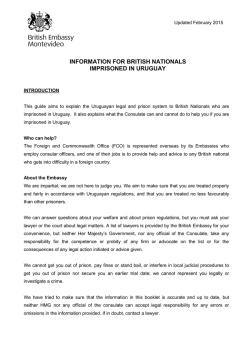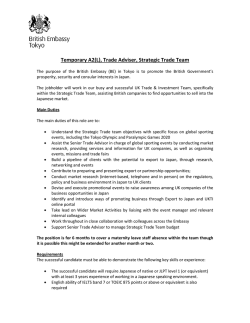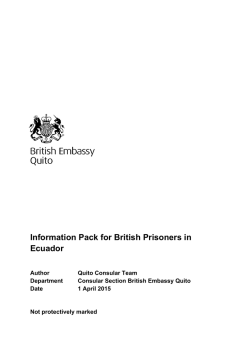
Dominican Republic - Prisoner Pack
INFORMATION FOR BRITISH NATIONALS IMPRISONED IN THE DOMINICAN REPUBLIC BRITISH EMBASSY SANTO DOMINGO CONSULAR SECTION Av. 27 Febrero No 233 Edif. Corominas Pepin, 8vo piso, Santo Domingo, Republica Dominicana Tel: (809) 472-7111 Fax: (809) 381-1238 Web/E-mail: https://www.gov.uk/government/world/dominican-republic [email protected] Updated: 27 April 2015 Contents Introduction ......................................................................................................................................................... 4 Who can help? ................................................................................................................................................ 4 About the Embassy ......................................................................................................................................... 4 Who are the Consular Representatives? ......................................................................................................... 4 Contact Information ......................................................................................................................................... 4 First Steps........................................................................................................................................................... 5 Who will know I have been detained? .............................................................................................................. 5 What will my family be told? ............................................................................................................................ 5 What will the Embassy do?.............................................................................................................................. 5 Would I have a criminal record in the UK? ....................................................................................................... 5 Visits ................................................................................................................................................................... 6 How do my family and friends arrange a visit?................................................................................................. 6 How many visits am I allowed? ........................................................................................................................ 6 Consular visits ................................................................................................................................................. 6 What can visitors bring? .................................................................................................................................. 6 Prison conditions/services ................................................................................................................................... 7 Arrival at the prison.......................................................................................................................................... 7 General prison conditions ................................................................................................................................ 7 How can I receive money? .............................................................................................................................. 7 Can I work or study in prison? ......................................................................................................................... 8 Can I receive medical and dental treatment? ................................................................................................... 8 Food and Diet .................................................................................................................................................. 8 Mail/Parcels ..................................................................................................................................................... 8 Can I make telephone calls? ........................................................................................................................... 8 Leisure and entertainment ............................................................................................................................... 9 Drugs............................................................................................................................................................... 9 How can I make a complaint about mistreatment?........................................................................................... 9 The Dominican Republic Judicial System.......................................................................................................... 10 What should happen when I am arrested? .................................................................................................... 10 For how long can I be remanded in custody? ................................................................................................ 10 What happens when I am charged? .............................................................................................................. 10 What provision is there for bail?..................................................................................................................... 10 What kind of legal assistance is available ...................................................................................................... 11 What happens at the trial? ............................................................................................................................. 11 Sentences ..................................................................................................................................................... 11 How can appeals be made? .......................................................................................................................... 11 What provision is there for reduction of sentence (remission) e.g. for good behaviour? ................................. 11 What provision is there for early release e.g. on parole? ............................................................................... 12 What provision is there for clemency or pardon? ........................................................................................... 12 What about any financial penalties? .............................................................................................................. 12 Is transfer to another prison within the Dominican Republic possible? ........................................................... 12 Is transfer to the UK a possibility? ................................................................................................................. 12 What are the procedures for release and deportation? .................................................................................. 12 Prisoners Abroad .............................................................................................................................................. 13 Annexes …………………………………………………………………………………………………………………….14 Glossary of Terms ............................................................................................................................................. 15 Useful legal terms .......................................................................................................................................... 15 Key phrases – English into Spanish .............................................................................................................. 15 Disclaimer ......................................................................................................................................................... 25 Introduction Who can help? The Foreign and Commonwealth Office (FCO): The FCO is represented overseas by its Embassies and Consulates (High Commission in Commonwealth Countries). Both employ consular officers, and one of their duties is to provide help and advice to any British National who gets into difficulty in a foreign country. About the Embassy We are impartial; we are not here to judge you. We aim to make sure that you are treated properly and fairly in accordance with local regulations, and that you are treated no less favourably than other prisoners. We can answer questions about your welfare and about prison regulations but you must ask your lawyer or the court about legal matters. The attached list of lawyers is provided by the British Embassy for your convenience, but neither Her Majesty‟s Government, nor any official of the Consulate, take any responsibility for the competence or probity of any firm/advocate on the list or for the consequence of any legal action initiated or advice given. We cannot get you out of prison, pay fines or stand bail or interfere with local judicial procedures to get you out of prison nor secure you an earlier trial date; we cannot investigate a crime. We have tried to make sure that the information in this booklet is accurate and up to date, but the British Embassy cannot accept legal responsibility for any errors or omissions in the information. If in doubt contact a lawyer. Who are the Consular Representatives? Steve Morgan, Consul Viannela Severino, Vice-Consul Lourdes Martinez, Consular Officer Contact Information British Embassy Santo Domingo Consular Section, Piso 7, Ave. 27 de Febrero 233 Edificio Corominas Pepin Tel: 809 472 7111 Fax: 809 472 7574 Email: [email protected] Working Hours: Monday, Tuesday, Thursday and Friday: 08.00 – 13.00 Honorary Consulate in Puerto Plata Tel. 829 726 0757 Honorary Consulate in Punta Cana Tel. 829 726 0750 First Steps Who will know I have been detained? As soon as a British citizen is arrested and detained in Dominican Republic, the authorities should inform the British Embassy in Santo Domingo or our Honorary Consulates. But we are frequently not informed within 24 hours. It is essential that you inform the British Embassy or Consulate as soon as possible after your arrest. It is your right to do so. You may also be able to make a phone call to the Embassy or to family (with a covering charge). What will my family be told? For reasons of confidentiality we are not permitted to tell anyone that you have been detained or what the charges are without your permission. However, if you wish to inform your family, we can make contact with them through our colleagues in the FCO in London. We can give your family or next of kin advice on prison procedure, regulations, and how you are doing. We can also pass on any messages from you. What will the Embassy do? We aim to make contact with you within 24 hours of being notified of your arrest and visit you within 48 hours unless the offence is a minor one. After this, we aim to visit you every quarter. During our routine visits you will have the opportunity to discuss any health issues, security concerns, your treatment in prison and any other general issues that you wish to raise with our consular staff. At each consular visit, our staff will complete a “Visit Report Form”. If there is any information that you would prefer not to disclose to a Next of Kin you should let us know during the visit. If appropriate, we will consider approaching the local authorities if you are not treated in line with internationallyaccepted standards. Would I have a criminal record in the UK? You should be aware that if you are arrested for certain serious offences, such as sexual assault or drugs crimes, our staff must inform other relevant UK authorities. The information about the criminal offence will be sent to the ACPO Criminal Records office in the UK. It is therefore possible that information about this offence may appear if a criminal records check were carried out by a prospective employer for example. Visits How do my family and friends arrange a visit? We advise the family to contact us well in advance (three weeks) so that we can inform the prison authorities and work on the visiting programme. In order to receive visitors you should provide the prison with the names of the people visiting you for them to be added to the Prison Visiting list. Visitors must identify themselves when they arrive at the prison by showing an identification document containing a photograph (e.g. passport). This is held by the prison and returned at the end of the visit. Visitors will be searched before entering the prison. How many visits am I allowed? In the majority of the new model prisons you are allowed to receive visitors on Sundays. 8 adults and 8 children are allowed per prisoner per day. Old model prisons allowed visits on different days of the week and there is no restriction on number of visitors. Please check with the prison social workers when visits are allowed. Priests and representatives from local church groups or non-government organisations visit the prisons frequently. When family members come from the UK for visits consular staff usually try to arrange extra visit days considering the distance families had to travel to see you. These extra days are given by the prison authorities and the decision is discretionary. Consular visits We will visit you every three months; during our routine visits you will have the opportunity to discuss any health issues, security concerns, your treatment in prison and any other general issues that you wish to raise with our Consular staff. At each Consular visit, our staff will complete a “Visit Report Form”. If there is any information that you would prefer not to disclose to a Next of Kin you should let us know during the visit. What can visitors bring? Regulations vary from one prison to another. In the old model prisons visitors can bring money, food and reading material. In prisons run under the new model system food and other items are not allowed. In these prisons visitors can only bring money which will be deposited in your prison account. You will have access to your funds through tickets which are valid to buy stuff from the prison canteen. Families should contact the FCO in advance of their visit so we can provide them with an updated list. All bags and parcels will be searched before entry and authorities have the right to withhold items they deem to be unacceptable (amongst others, weapons, knives, alcohol, drugs, clothes made of black fabric, sunglasses, caps, play cards, food, medicines). Prison conditions/services Arrival at the prison When someone is arrested they are taken to a detention centre in the first instance. The case is reviewed by the District Attorney within 48 hours. If the DA finds grounds to file a case, the detainee is sent to prison on remand until a trial takes place. The District Attorney has 12-18 months to instrument the case. Remand and sentenced prisoners are not segregated Any belongings that are not part of the investigation, process, or evidence will be sent to the prison, if the prison has enough space to keep them. It is unfortunately not unusual for some belongings, including passports to go missing right after arrest or during prison transfers. The British Embassy cannot store your personal belongings on your behalf. Medical checks will be carried out by the prison health department in order to assess if you need any treatment for ongoing medical conditions (e.g. blood pressure, diabetes, HIV). General prison conditions Conditions in prisons run under the old model system are poor/harsh and over-crowding is a major problem, resulting in poor sanitary conditions, violence and prostitution. The new model prisons though have much better conditions for inmates and prison staff is more professional. In these prisons each cell has a toilet and wash basin. Showers are mostly separate and shared with the other cells. If you experience serious harassment, threats or violence you should report this to the Embassy as soon as possible. It is our responsibility to take up allegations of mistreatment against a British national. However, we will only raise concerns with the prison administration if you request that we do so. Money buys everything inside the old model prisons; therefore, sanctions are imposed on an arbitrary fashion. Foreigners are usually detained in new model prisons but if you are detained in one of the old model prisons consular staff could ask the authorities you are transferred to a new model prison. How can I receive money? There are two ways in which you can receive financial assistance while in prison. Private funds: Deposited to you by your family or friends through the Foreign Office in London. Money for prisoners should be sent to: The Foreign and Commonwealth Office Desk Officer for Dominican Republic Consular Directorate Room WH4.8, King Charles Street London SW1A 2AH Tel: +44 (0)20 7008 4507 Prisoners Abroad: If your family can‟t support you financially, you can register with Prisoners Abroad. They may be able to send you a small grant every quarter for essentials. Money received from the UK will be converted into local currency and held on your behalf by the Embassy. Our Consular staff will hand over funds to you during Consular visits. Please note that the Embassy does not provide financial support to British Nationals in prison abroad. Can I work or study in prison? There is little opportunity for employment, especially for those who do not speak Spanish. In prisons run under the new model there are some opportunities to get jobs in the kitchen or the carpentry or electricity workshops, which are the most popular options. New model Prisons offer basic courses of electricity, bakery, carpentry, etc. Informal Spanish lessons are offered to foreigners by local inmates. Prisoners Abroad can provide language dictionaries. Can I receive medical and dental treatment? If you need medical or dental treatment you should ask to see the prison doctor or dentist. Depending on number of patients, prisoners can either be assisted the same day or after 2-3 days. Basic medical attention is free of charge. It is unlikely that you will be treated by a doctor who speaks English. Prison doctors are often the equivalent of GPs in the UK, so unusual or complex problems may be referred to a specialist outside the prison for which permission from the Prisons Headquarter is required. Getting this permission could take several days. Very often medicine apart from common drugs or pain killers is not available in the prisons. In such instances you or the prison doctor should contact the Embassy. The cost of prescribed medication has to be covered either by the prisoner or, if a prisoner qualifies, through Prisoners Abroad´s medical fund. Food and Diet There is minimal provision of food within the prison. Prison food is free but is rarely sufficient to fulfil your dietary needs. You will need funds to pay for supplements to your diet, which can be bought from the prison shop, or from the cafeteria, when available. Mail/Parcels Friends and family can send mail and small parcels to the Embassy and we deliver to the prison on the next consular visit. The Embassy is not able to forward mail on your behalf back to the UK. All letters are opened and checked by prison staff before they are given to prisoners. Mail cannot be sent directly to the prison from the UK since there is no postal system in the prison. Can I make telephone calls? Usually there is access to a public telephone. Prisoners have to pay for international calls. Mobile phones are not allowed within new model prisons. If you are caught trying to use a mobile phone inside the prison you will be punished and as a result you might be sent to confinement for a period. Many prisoners have mobile telephones in the old model prisons. Leisure and entertainment Prisons often have a library with a small range of books available for inmates. However, most of the books are in Spanish language. British citizens living locally, the Embassy and Prisoners Abroad occasionally make donations of English language books/magazines to prisoners. Prisoners are allowed several hours per day (this varies from one prison to another) in the patio for recreational activities. In the new model system prisons there are TV sets available for inmates in common areas. In the old model prisons radios, TVs are accepted if prisoners can afford them. But having expensive items in your cell may attract unwanted attention from other inmates. In the new model prison, inmates cannot have any of these items. Most prisons have a gym, but often they are not properly equipped. Drugs Drugs could be available within some Dominican prisons, although officially prison authorities deny this. Do everything you can to find other ways to cope with life in prison and avoid consuming drugs. Not only will drug consumption weaken further your state of health, but drug taking invariably results in the creation of personal debts. These debts will attract accelerated rates of interest and if not paid off, could result in serious verbal and physical harassment. How can I make a complaint about mistreatment? If you wish to file a complaint you would need to speak or write a letter to the Director of the prison. We recommend you let us know any case of mistreatment and we will take your concerns forward. The Dominican Republic Judicial System Prisoners are presumed innocent until proven guilty, they have a right to legal representative, interpreter, fair trial and appeal. The remand period, in which the state prosecutor leads the investigation of your case, could be three to eighteen months. Time served on remand will be counted as part of your sentence. On the whole the Dominican judicial system is very bureaucratic. Also, lawyers can charge outrageous sums of money, make grand promises and deliver very little. Prisoners can remain in prison without having been sentenced for well over a year. Remember, you should never sign anything you cannot read. If you find yourself under pressure to sign, ask to speak to the British Embassy What should happen when I am arrested? If you are arrested at the airport you will initially spend some time in a police cell near the airport. You will usually be taken to the competent authority (prosecutor) within 48 hours. Police should read the charges and your rights. Whilst you are there prosecutor will usually gather evidence and interrogate you. Although the law states that you are allowed to immediately appoint a lawyer and interpreter, in the case of drug offences, this will only be permitted shortly before giving your statement. You will then be placed on remand. At the moment of your arrest you should be made aware of your rights; one of them is to have a phone call. You should inform the authorities if you wish the British Embassy to be informed of your arrest. If you can‟t afford a private lawyer or interpreter the Dominican government will appoint a public defender and an interpreter for you. For how long can I be remanded in custody? According to the law, the remand period, in which the state prosecutor leads the investigation of your case, should not exceed eighteen months. After the preliminary investigation phase, the prosecutor has a maximum of 90 days to reach a judgement. However, the state prosecutor can request an extension of a maximum of 180 days to complete the investigation. In general, a trial could last two - three years. Time served on remand will be counted as part of your sentence. You can receive visitors whilst on remand. What happens when I am charged? The lawyer and the accused are immediately notified of the prosecutor‟s judgement. According to the law, a first hearing before a Judge should take place within 15-45 days of the judgement. In practice, this does not always happen (it is often much longer). At this hearing the prosecutor defends his/her judgement. At this point, all parties can also present more evidence. Immediately after the hearing, the judge should announce his decision. Hearings can be adjourned several times. What provision is there for bail? Prisoners can apply for bail after serving the half of their sentence provided they have observed a good conduct in prison. The defendant‟s lawyer is responsible for submitting this application to the court. Your lawyer/public defender are best placed to advice on this matter. Bail is only granted to foreign nationals if they have a sponsor who guarantees employment and accommodation to the prisoner until the end of his/her sentence. Foreigners released on bail cannot leave the Dominican Republic until the end of their sentence. What kind of legal assistance is available Consular staff cannot give legal advice, but they can provide you with a list of lawyers, some of whom speak English. You can hire a lawyer for yourself at any time after your arrest; a list of lawyers is included in this information pack. Normally, if you hire a private lawyer she/he will ask for a cash advance on his/her estimated legal fees (which may be very high) before s/he will take your case on. The British Embassy cannot pay legal fees or guarantee to a lawyer that you will pay them. As in any country, some lawyers are better than others (paying a large fee does not guarantee that you will get a good lawyer). If you do decide to pay for a lawyer, it is wise to agree a flat fee for the whole case before they begin work or you may find yourself facing „extra expenses‟. If you do not have funds to hire a private lawyer, legal aid lawyers are free of charge but they rarely speak English and their ability varies. On the whole, given their heavy workload, legal aid lawyers make very little effort to compile evidence and move a case forward. What happens at the trial? There is no jury system in the Dominican Republic. Courts are usually made up of three legal representatives, the secretary of the tribunal (court), the prosecutor, the lawyer, the accuser, the accused, and the translator/interpreter. It is compulsory that all the above are present at the court hearing, otherwise it will be delayed. All documents related to a case and further evidence must be submitted to the president of the court. The trial will be heard in Spanish. Dominican law states that an interpreter should be provided by the State. However if there is none available the day of your hearing, you would need to appoint and pay for an interpreter. Consular staff cannot act as interpreters. Consular officers can attend court hearings as observers. Sentences Length of sentences varies from case to case. The maximum length of sentence is 40 years. Your lawyer/public defender will be best placed to advise on length of sentences. How can appeals be made? The accused has the right to appeal their sentence to an Appeal Court through their lawyers or public defender. The appeal process is usually very slow. A lawyer opinion of the case is strongly recommended before proceeding. What provision is there for reduction of sentence (remission) e.g. for good behaviour? There is no provision for reduction of sentence automatically. However, prisoners can apply, through their lawyers, for a reduction of sentence after serving half of their sentence. Final decision is made by a judge. What provision is there for early release e.g. on parole? Prisoners can apply for bail after serving the half of their sentence provided they have observed a good conduct in prison. Your lawyer/public defender are best placed to advice on this matter. Bail is only granted to foreign nationals if they have a sponsor who guarantees employment and accommodation to the prisoner until the end of his/her sentence. What provision is there for clemency or pardon? Your lawyer is best placed to advise you on the possibility of clemency or pardon What about any financial penalties? The Judge could enforce a fine as part of the sentence. If this is the case prisoner is not released until the fine is paid. Is transfer to another prison within the Dominican Republic possible? Yes, if the prison general director authorises the transfer. Transfers to other prisons are only permitted when there are exceptional compassionate or medical reasons for doing so. If you are interested in a transfer, please speak to the Embassy who can raise your request in writing with the prison authorities. Is transfer to the UK a possibility? No, although there is a Prisoner Transfer Agreement signed between the governments of the UK and the Dominican Republic, it has not yet been ratified by the Dominican authorities. What are the procedures for release and deportation? At the end of your sentence, and after payment of any fine imposed, you will be deported back to the UK at your own expense. Friends or family will have to buy you another return air ticket. Prisoners Abroad Since 1978 the charity Prisoners Abroad has offered practical support and advice to British citizens imprisoned overseas. It is the only UK charity providing this service and it is available to all, whether guilty or innocent, convicted or on remand. Prisoners Abroad is concerned with your health and welfare, both during your imprisonment and also on your return to the UK, through their resettlement service (if you have registered whilst in prison). They can also provide support and advice to your family during your imprisonment. In order to access any services, prisoners must first register with Prisoners Abroad by signing and returning their authorisation form. Once you seek help from Prisoners Abroad, the Prisoner & Family Support Service will be your point of contact for advice and information. The type of assistance they can offer will vary from country to country, but generally they can provide you with information, in English, on: your rights as a prisoner and issues that may affect you such as health or transfer to the UK obtaining magazines, newspapers, books and the regular Prisoners Abroad newsletter writing to a pen pal learning the language of your country of imprisonment translation of documents grants for food if you are in a developing country and don‟t have funds from other sources grants for essential medicines and toiletries if you don‟t have funds from other sources preparing for release help for your loved ones, including information, family support groups and assistance with the cost of visiting Prisoners Abroad 89 – 93 Fonthill Road London N4 3JH UK Telephone: 00 44 (0)20 7561 6820 or, for your relatives in the UK, Freephone 0808 172 0098 (Mondays to Fridays 9.30 am to 4.30 pm, UK time) Email: [email protected] Website: www.prisonersabroad.org.uk Annexes Annex 1: List of English-Speaking Lawyers Annex 2: List of Private Translators/Interpreters Annex 3: FCO leaflet: In prison abroad Annex 4: Prisoners Abroad authorisation form Annex 5: Prisoners Abroad family contact form Annex 6: Prisoners Abroad CFF form Annex 7: Fair Trials International Glossary of Terms Useful legal terms Key phrases – English into Spanish In Spanish all nouns have a gender, either masculine or feminine (for example, the word for 'house' (casa) is a feminine noun so 'a house'/'the house' is translated as 'una casa'/'la casa'. The word for 'book' (libro) is a masculine noun so 'a book'/'the book' is translated as 'un libro'/'el libro'). The gender of the word will affect adjectives which refer to that word. For example, if you want to say 'the red house' you would say 'la casa roja'. If you wanted to say 'a red book' you would say 'un libro rojo'. Where appropriate, the gender of each form of the word has been given below: masculine forms of the word are denoted by '(m)', feminine by '(f)'. The plural form of the word (i.e when there is more than one of the object concerned) is denoted by 'pl'. So, 'these houses' would appear as 'estas casas (fpl)' and 'those books' would appear as 'esos libros (mpl)'. Accents may appear above certain vowels, helping pronunciation by indicating where the stress should be placed in that particular word (e.g. prisión, miércoles, teléfono). In the absence of accents, words ending in either a vowel or …n / …s will have stress placed on the penultimate syllable (e.g. nosotros, transferido, urgente). If the word ends in a consonant other than …n / …s, the last syllable is stressed (e.g. necesitar, enfermedad, español) Basics My name is… Me llamo…. I am… (e.g. I am English) Soy… The El/La/Los/Las A Un/Una/Unos/Unas It Lo/la/le I/We/Me Yo/Nosotros/me What/Which Qué/Cuál Left Izquierda Right Derecha Here Aquí There Ahí What day does the… ¿Qué día…? I cannot… No puedo… Verbs To have tener I have yo tengo you (singular) have tú tienes he/she has él/ella tiene we have nosotros/as tenemos you (plural) have vosotros/as teneis they have ellos/as tienen (In Spanish, there are two verbs which translate as „to be‟: „ser‟ and „estar‟. „Ser‟ is meant to convey something permanent (e.g. „I am English‟, „I am a man‟), and „estar‟ is meant to convey something more temporary like a mood or emotion (e.g. „I am ill‟, or „I am happy‟). To be ser I am yo soy you (singular) are tú eres he/she is él/ella es we are nosotros/as somos you (plural) are vosotros/as sois they are ellos/as son To be estar I am estoy you (singular) are tú estás he/she is él/ella está we are nosotros/as estamos you (plural) are vosotros/as estais they are ellos/as están To want/I want Querer/yo quiero To need/I need Necesitar/yo necesito To feel/I feel Sentir/yo siento To have to/I have to Tener que/yo tengo que To see/I see Ver/yo veo To use/I use Usar/yo uso To speak/I speak Hablar/yo hablo To write/I write Escribir/yo escribo To go/I go Ir/yo voy After Después Before Antes During Durante Since Desde Until Hasta In/inside en/dentro Outside Fuera At en From De/desde On en/encima Under/below/beneath Debajo Above Encima To be able to Poder/yo puedo To give Dar/yo doy Prepositions Over por encima de Beside/next to/by al lado de Near to cerca de Through a través Towards hacia Behind detrás Between entre Opposite en frente With con Without sin Basic communication Hello Hola Good afternoon Buenas tardes Good evening Buenas tardes Good night Buenas noches How are you? ¿Cómo estás? Fine thanks, and you? Bien gracias, ¿y tú? Excuse me Perdone See you later Hasta luego Yes Sí No No Please Por favor Thank you Gracias I don‟t know No sé Could you repeat that more slowly? ¿Puedes repetir más despacio? I don‟t understand No entiendo I do not speak …… very well No hablo muy bien …. I am sorry to bother you but… Siento molestarte pero…. May I borrow your… ¿Me prestas tu…? How can I obtain…? ¿Cómo puedo obtener…? Is there any mail for me? ¿Hay correo para mí? How much does this cost? ¿Cuánto cuesta esto? Do you mind if I open the window? ¿Te importa si abro la ventana? Do you mind if I smoke? Te importa si fumo? Could you kindly write that down for me? ¿Podrías escribir eso para mí por favor? Do you have the correct time? ¿Tienes la hora correcta? What is your nationality? ¿Cuál es tu nacionalidad? Useful phrases/vocabulary The telephone is out of order I do not have any means to buy… I would like to order… This is urgent May I make an appointment to see… I need to see my lawyer Can I have a list of local English-speaking lawyers? Who is dealing with my case? Does the prison have a list of translators? Can I get bail? Can you tell me how long I will be held in police custody before I get transferred to a prison? What must I do to get transferred to another prison? Can you tell me how long my sentence is? Can you tell me the date my sentence finishes? Can I move to Mr…..‟s cell as he speaks English? Can Mr….. move into this cell? I am very cold, can I have an extra blanket please? When is the shop open? How much money do I have in my account? What day does the doctor come? What time? Is there any work that I can do? I would like to work in the… Can you show me what I must do? Could I buy a Spanish/English dictionary? Can you contact the Consul for me? El teléfono no funciona No me puedo permitir comprar… Me gustaría pedir… Esto es urgente ¿Podría fijar una cita con…? Necesito ver a mi abogado ¿Me das una lista de abogados que hablen ingles? ¿Quién está a cargo de mi caso? ¿Hay una lista de traductores en la prisión? ¿Puedo pedir la libertad bajo fianza? ¿Me podrías decir cuánto tiempo estaré detenido antes de ser transferido a una prisión? ¿Qué debo hacer para ser transferido a otra prisión? ¿Me podrías decir cuánto tiempo durará mi sentencia? ¿Me podrías decir la fecha en que mi sentencia terminará? ¿Me puedo cambiar a la celda del Sr…., ya que habla inglés? ¿Puede el Sr… cambiarse a esta celda? ¿Tengo mucho frío, me das otra manta por favor? ¿Cuándo abre la tienda? ¿Cuánto dinero tengo en mi cuenta? ¿Qué día viene el médico? ¿A qué hora? ¿Hay algún trabajo que puedo hacer? Me gustaría trabajar en el/la…. ¿Me puedes enseñar lo qué debo hacer? ¿Podría comprar un diccionario de ingles/espanol? ¿Puedes contactar el cónsul para mí? I want to make a complaint Can I have permission for my family to send me….? As I am not allowed visits, could I have a parcel of clothes sent to the prison? Are there any items which they are not permitted to send me? I want to send this letter to… Why are my letters taking so long to get to my family? I have not heard from my family and I am worried about them How do I arrange a visit for my family? Can you confirm that my family has booked a visit for (a specific date)? May I have an extended visit as I do not get many and my family has to travel a long way? Could I go to the prison school to learn Spanish? Could you give this letter to Mr… cell no…. so he can translate it for me? Time/days/numbers Today Hoy Tomorrow Mañana Morning Mañana Afternoon Tarde Night Noche Next week La próxima semana Next month El próximo mes Next year El próximo año Last week La semana pasada Last month El mes pasado Last year El año pasado Weekend Fin de semana Monday Lunes Tuesday Martes Wednesday Miércoles Thursday Jueves Friday Viernes Saturday Sábado Sunday Domingo January Enero February Febrero March Marzo April Abril May Mayo June Junio July Julio August Agosto September Septiembre Quiero poner una queja Me gustaría pedir permiso para que mi familia me envíe… Como no tengo permitido ninguna visita, ¿se me podría enviar un paquete de ropa a la prisión? ¿Hay algo que no pueden enviarme? Quiero enviar esta carta a…. ¿Por qué mis cartas tardan tanto en llegar a mi familia? No sé nada de mi familia y estoy preocupado/a por ellos. ¿Qué tengo que hacer para arreglar una visita de mi familia? ¿Podrías confirmar qué día ha reservado mi familia para visitarme? ¿Podría pedir una visita más larga ya que no recibo muchas visitas y mi familia tiene que viajar de lejos? ¿Podría ir a las clases de la prisión para aprender español ¿Podrías darle esta carta al Sr…. celda número … para que la traduzca para mí? October Octubre Eleven (eleventh) Once (décimoprimero/a) November Noviembre Twelve (twelfth) Doce (décimosegundo/a) December Diciembre Thirteen (thirteenth) Trece (décimotercero/a) Spring Primavera Fourteen (fourteenth) Catorce (décimocuarto/a) Summer Verano Fifteen (fifteenth) Quince (décimoquinto/a) Autumn Otoño Sixteen (sixteenth) Dieciseis (décimosexto/a) Winter Invierno Seventeen(seventeenth) Diecisiete (décimoséptimo/a) Christmas Navidad Eighteen (eighteenth) Dieciocho (décimoctavo/a) Easter Semana Santa Nineteen (nineteenth) Diecinueve (décimonoveno/a) New Year Año Nuevo Twenty (twentieth) Veinte (vigésimo/a) National Holiday Día festivo Thirty (thirtieth) Treinta (trigésimo/a) One (first) Uno (primero/a) Forty (fortieth) Cuarenta (cuadragésimo/a) Two (second) Dos (Segundo/a) Fifty (fiftieth) Cincuenta (quincuagésimo/a) Three (third) Tres (Tercero/a) Sixty (sixtieth) Sesenta (sexagésimo/a) Four (fourth) Cuatro (cuarto/a) Seventy (seventieth) Setenta (septuagésimo/a) Five (fifth) Cinco (quinto/a) Eighty (eightieth) Ochenta (Octogésimo/a) Six (sixth) Seis (sexto/a) Ninety (ninetieth) Noventa (nonagésimo/a) Seven (seventh) Siete (séptimo/a) Hundred (hundredth) Cien (centésimo) Eight (eighth) Ocho (octavo/a) Thousand Mil (milésimo/a) Nine (ninth) Nueve (noveno/a) What time is it? ¿Qué hora es? Ten (tenth) Diez (décimo/a) 07h00 Seven o‟clock in the morning Las siete de la mañana 07h30 Seven thirty in the morning Las siete y media de la mañana 12h00 Midday Las doce del mediodía 13h00 One o‟clock in the afternoon La una de la tarde 14h40 Two-forty in the afternoon Las dos y cuarenta de la tarde 19h45 seven-forty-five in the evening Las siete y cuarenta y cinco de la tarde 00h00 midnight Las doce de la noche (medianoche) General vocabulary Cell Celda Bed Cama Individual cell Celda individual Shared cell Celda compartida Library Biblioteca Showers Duchas Toilet Cuarto de baño Visiting rooms Salas de visita Garden Jardín Reception Recepción Director Director Assisant Director Ayudante del director Shopkeeper Tendero/a Guard/Warder Guardia/Vigilante Stationery Books Libros Pen Bolígrafo Paper Papel Letter Carta Envelope Sobre Stamp Sello Telephone Teléfono Toiletries Soap Jabón Shampoo Champú Toothbrush Cepillo de dientes Toothpaste Pasta de dientes Deodorant Desodorante Tissues Pañuelos de papel Toilet Paper Papel higiénico Wash Lavar Razor Cuchilla de afeitar Shave Afeitar Towel Toalla Other items Shop/Canteen Tienda/Cantina Blanket Manta Radio Radio CD/cassette player Lector de CDs/Radio-cassette Playing cards Una baraja Ball Pelota Battery Pila/Batería Clothing Shirt Camisa Shorts Pantalones cortos Shoes Zapatos Socks Calcetines Underwear Ropa interior Trousers Pantalones T-shirt Camiseta Trainers Zapatillas de deporte Jumper/pullover Jersey Jeans Vaqueros Vest Camiseta de tiras Sandals Sandalias Small Pequeño/a Medium Mediano/a Large Grande Proper Nouns British Consul Cónsul británico/a Britain Gran Bretaña British Británico/a England Inglaterra Scotland Escocia Wales Gales Northern Ireland Irlanda del Norte Family Friend Amigo/a Family Familia Mother Madre Father Padre Sister Hermana Brother Hermano Husband Marido Wife Mujer Partner Pareja Daughter Hija Son Hijo Child Niño/a Cousin Primo/a Food/meals Breakfast Desayuno Lunch Comida Dinner Cena To eat Comer To drink Beber Knife Cuchillo Fork Tenedor Spoon Cuchara Tray Bandeja Glass Vaso Cup/Mug Taza Plate Plato Bottle Botella Coffee Café Tea Té Water Agua Milk Leche Powdered milk Leche en polvo Soda Soda Hot chocolate Chocolate caliente Fresh fruit Fruta fresca Apple Manzana Orange Naranja Banana Plátano Pear Pera Meat Carne Lamb Cordero Beef Carne de Res Pork Cerdo Ham Jamón Bacon Beicon Chicken Pollo Fish Pescado Tuna Atún Cod Bacalao Sea food Marisco Vegetables Vegetales Cabbage Repollo Carrot Zanahoria Mushroom Champiñón Spinach Espinaca Beans Habichuelas Green beans Judías verdes Peas Guisantes Potato Patata Peppers Pimientos Onion Cebolla Lettuce Lechuga Bread Pan Rice Arroz Pasta Pasta Butter Mantequilla Jam/preserve Mermelada Eggs Huevos Cheese Queso Oil Aceite Salt Sal Sugar Azúcar Yoghurt Yogur Biscuits Galletas Cereal Cereales Chocolate Chocolate Body/Health I need to see the Doctor I require medical assistance for the following reasons… It is urgent I don‟t feel very well I am bleeding I have a pain in my… Mild pain Severe pain I have a cold/flu I have a sore throat I have a fever I am allergic to… I am having problems breathing I have a cold I have an upset stomach I am constipated I have diarrhoea I have spots I have a rash I am diabetic I am epileptic I have heart problems I have ear ache I have a headache I have cramps I have problems with my eyes I need to have my eyes tested I am pregnant I have high/low blood pressure I have high cholesterol Have you something for… Do you have a bandage? Necesito ver a un médico Necesito ayuda médica por las siguientes razones… Es urgente No me siento muy bien Estoy sangrando Me duele el/la… Dolor moderado Dolor fuerte Tengo un resfriado/gripe Me duele la garganta Tengo fiebre Soy alérgico a… Tengo problemas al respirar Tengo catarro Me duele el estómago Estoy estreñido/a Tengo diarrea Tengo granos Tengo un sarpullido Soy diabético/a Tengo epilepsia Tengo problemas del corazón Me duele el oído Me duele la cabeza Tengo calambres Tengo problemas en los ojos Necesito que me examinen los ojos Estoy embarazada Tengo la tensión alta/baja Tengo el colesterol alto ¿Tienes algo para…? ¿Tienes una venda? Human Body The head La cabeza The skull El Cráneo Hair Pelo Face Cara Eye/eyes Ojo/ojos Nose Nariz Mouth Boca Lips Labios Tongue Lengua Ear Oreja (external)/Oído(internal) Neck Cuello Throat Garganta Shoulder Hombro Chest Pecho Breasts (female) Pechos Stomach Estómago Back Espalda Arms Brazos Elbow Codo Hand Mano Finger Dedo Thumb Dedo pulgar Hip Cadera Anus Ano Penis Pene Testicles Testículos Vagina Vagina Leg Pierna Knee Rodilla Ankle Tobillo Foot Pie Heel Talón Toe Dedo del pie Limb Extremidad Muscle Músculo Bone Hueso Spinal column Columna Vertebral Rib Costilla Skin Piel Heart Corazón Lungs Pulmones Liver Hígado Kidneys Riñones Bladder Vejiga Breathing Respirar Blood Sangre Dental terms I need to see the dentist I have toothache I have broken a tooth A filling Tooth decay A tooth A wisdom tooth Necesito ver al dentista Me duele un diente/muela Tengo un diente/muela roto/a Un empaste Carie Un diente/muela Muela del Juicio Phrases which may be used by the doctor Where does it hurt? Do you have a temperature? Do you have any allergies? Do you suffer from any other illnesses? What medication do you take normally? Are you receiving medical treatment now? What type? Since when? Is this the first time you have had this problem? Do you have a cold? How much do you weigh? Step onto the scales please? Please lie on the bed Please take off your shirt This is a prescription for… Are you a drug addict? You must take this medication… …before you go to bed …in the morning and in the evening Dónde te duele Tienes fiebre? Tienes alguna alergia? Sufres alguna otra enfermedad? Que medicamentos toma normalmente? Está recibiendo tratamiento medico ahora? De qué tipo? Desde cuando? Es esta la perimera vez que ha tenido este problema? Tienes catarro/gripe? Cuánto pesas? Suba al peso, por favor Por favor, acuéstese en la camilla/cama Quítese la camisa, por favor Esto es una receta para….. Tiene adicción a alguna droga? Debe tomar este medicamento… …antes de irte a la cama …en la mañana y en la noche Prescribed drugs/treatment Painkiller Analgésico Antibiotics Antibiótico Analgesics Analgésico Aspirin Aspirina Sleeping tablet Pastillas para dormir Tranquiliser Tranquilizante Laxative Laxante Antiseptic Antiséptico Lice treatment Tratamiento para piojos Inhaler Inhalador Tablet/Pill Pastilla/Píldora Capsule Cápsula Cream Crema Injection Inyección Vaccine Vacuna Bandage Venda S:\Consular\Official\Prisoners\Prisoners Pack\Prisoners Pack - Dominican Republic.doc-June2015.docx UNCLASSIFIED Disclaimer This booklet was compiled by the Consular Section, British Embassy Santo Domingo. It is revised on a regular basis If any of the information contained in this booklet is incorrect, please draw inaccuracies to our attention so that we can make amendments. The British Embassy in Santo Domingo is not accountable for the information provided in this booklet. Local proceedings are subject to change at any time. Thank you. 27 April 2015 25
© Copyright 2026
